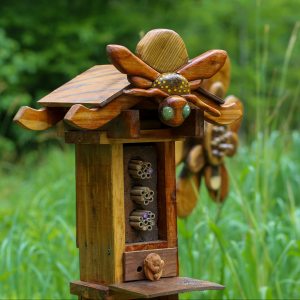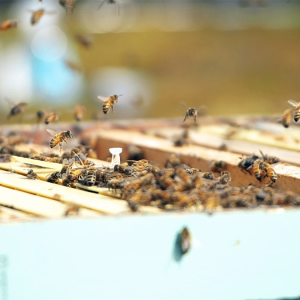Through the Carolina Beekeeping Club, Tar Heels are learning to care for hives and exploring the impact bees have on our environment and food systems.
Press the play button above
Carolina's campus is known for its beauty — particularly in the spring and summer when the trees and flowers bloom. While the University is home to teams of staff that maintain our historic campus, they also get a small assist from one of the University's most valuable natural resources: bees.
From volunteering as student beekeepers to initiating campus-wide projects, Tar Heels are actively working to care for bees and other pollinators, and the entire Carolina community reaps the benefits of that work.
This week, we're celebrating the small insects that help keep our campus beautiful and the Tar Heels who are working to protect them.
Through the Carolina Beekeeping Club, Tar Heels are learning to care for hives and exploring the impact bees have on our environment and food systems.
Press the play button above

Read more about the NC Botantical Garden's bee hotelsLocated just off main campus, the North Carolina Botanical Garden is caring for its pollinators by placing bee hotels in the gardens. The structures were designed to provide refuge for the native pollinators and provide a place to lay their eggs.

Learn more about our Bee Campus USA distinctionCarolina has been named a Bee Campus USA affiliate, joining more than 60 other universities working to improve their ornamental landscapes to sustain pollinators. The distinction recognizes the collective strength of educational campuses nationwide to benefit pollinators.
The bees from the Carolina Beekeeping Club hive can pollinate plants as far as Coker Arboretum, providing for the flowers and plants across our campus.
Among the gardens pollinated by campus bees are our those that are part of Edible Campus UNC, which creates working landscapes across UNC-Chapel Hill to facilitate campus community engagement in topics of food and agriculture sustainability.
Carolina's campus is 81 acres of trees, shrubs, plants, flowers, grass, weeds and pathways that require pruning, fertilizing, mulching, watering and planting. Meet the people keeping Carolina beautiful.
Protecting our pollinators is just one way Tar Heels are working to make the University and state greener.
Carolina students, faculty and staff are conducting research, launching programs and leading change to protect habitats across our state and tackle environmental challenges on our campus and around the world.
Click on a story below to learn more